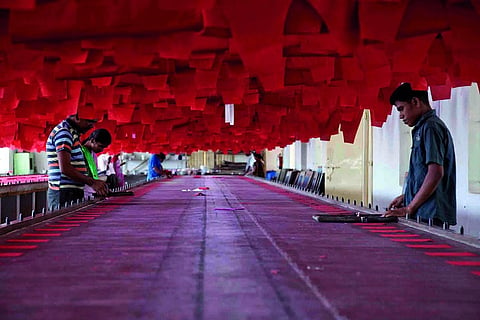

By the end of last week, Tamil Nadu’s automobile sector had laid off 5,000 contract workers due to decrease in demand which reflects as a parallel decrease in production. While it was Chennai that was largely hit by the automotive sector’s sudden layoffs, cities in western Tamil Nadu, such as Coimbatore and Tirupur which play a dominant role in the country’s textile and garment sector, have also started to feel the pangs of an impending slowdown.
However, one silver lining seems to be the trade sanctions imposed by the United States on Chinese products, which has started showing its effect, however tiny, in the Indian textiles market. The US has imposed a 10% duty on Chinese products that are being imported into the country. This includes textiles – both cotton and synthetic fabrics.
The situation is not as bad as the automotive sector, says Arul Saravanan of Tirupur’s SCM Garments, since the three months from June to August is generally a lean period for the industry.
Competition for India
China has around 33% market share in the US garment import industry while India’s share hovers around 4%.
Speaking to TNM about the impact of the trade sanctions on the garment industry, Prabhu, Convener of the Indian Texpreneurs Federation (ITF), a collective of around 550 medium and large-scale textile companies in west Tamil Nadu, says that whatever growth the industry sees, it will happen slowly.
“The hike in import duty by the US is coming into effect from September 1. Though we have seen a slight increase in orders from the US, the change is extremely slow,” he says. Adding that India has competitors in countries like Vietnam and Cambodia, he points out that more countries are waiting to share the spoils of the trade sanctions.
Sanctions might not affect China
Though India is a powerful player in cotton-based fabric, it loses out to China when it comes to man-made fabrics like polyester, says Vikranth Reddy, a textile sourcing consultant.
“Buyers in the US want more polyester fabrics and China is a monster in exporting them. Vietnam, Cambodia and countries like Egypt are also exporters of polyester-mix fabric,” he says. Adding that while the US imposing sanctions on China might seem like good news to India, he points out that the Chinese government has made necessary adjustments to keep the impact on their exporters to a minimum.
“China decreased their currency value and made the US dollar stronger. This means that those importing Chinese items into the US will have to pay less for it. In effect, US buyers will be paying the same price or even less due to this adjustment by the government of China,” he explains.
New jobs for India?
That said, the chances of creating new jobs in the garment and textile industry due to this opportunity is less because the growth due to the sanctions is very slow.
“In the first five months of this financial year, our US exports have grown by a little over 10%. This is the first time we have touched double-digit growth. If this growth hits 15%, I think that will be a good production volume for us,” says Prabhu.
Though yarn companies have cut down on production by 15-20%, Prabhu points out that spinning units in Coimbatore and Tirupur have been operating at lesser than normal capacity the past few weeks. Many companies have also reportedly cut down one shift and given an extra day’s leave to workers due to low demand.
“These are paid leaves. We have not retrenched workers because once we let them go, it is difficult to get resources back. Also, since the new cotton season begins every October, we expect the situation to get better soon,” Prabhu says. He adds that the industry is on a ‘wait and watch’ mode.
When asked to quantify the possible number of new jobs that could be created, Prabhu explains that if the increase in order value from the US due to the sanctions is worth Rs 7,000 crores, that will create around 1.5 lakh direct jobs in the industry. Till then, the units will be pushing to run in full installed capacity.
While the two sides of the industry differ in their opinions on the possible impact on revenue, they are one in their voice in demanding government intervention to revamp policies concerning the textile industry. While Prabhu wants the government to intervene and address the GST issues (by introducing same rate for all raw materials) plaguing the industry, Vikranth says that the government must start incentivising stakeholders in the man-made fibres sector too.